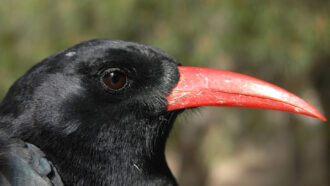Humans
-
 Humans
HumansWant to improve your reading skills? You might just need more space
A simple change by publishers and Web designers could help kids — both with and without dyslexia — read faster and better.
-
 Tech
TechSomeday soon, smartwatches may know you’re sick before you do
Such an early detection of flu-like infections could tell you when to avoid others to limit the spread of disease.
-
 Humans
HumansResearchers role-played as Neandertals to learn how they hunted birds
By pretending to be Neandertals, researchers show that the ancient hominids likely had the skills to hunt crowlike birds called choughs.
-
 Brain
BrainConcussion patients should avoid screen time for first two days
Teens may find it hard to avoid screen time, but data from a new study suggest it can speed their recovery.
-
 Psychology
PsychologyA growing share of teens feels lonely at school
Data from kids in 37 nations links this to use of cell phones and the internet.
-
 Psychology
PsychologyPsychology shines light on the harm racism can do
All forms of racism are harmful. Research sheds new light on the biases behind racism and the many ways it can affect our mental health.
-
 Health & Medicine
Health & MedicineWhat to know as Pfizer’s COVID-19 vaccine rolls out for kids under 12
After a trial in which no unusual side effects were reported, and approval by the FDA and CDC, kids ages 5 to 11 will be able to receive the COVID-19 vaccine.
-
 Tech
TechDid Facebook put Instagram profits ahead of teen safety?
Former employee said Facebook (now Meta) ignored its own research on Instagram risks to teens’ mental health. We look at the issues and what you can do.
-
 Animals
AnimalsLet’s learn about the creatures of Halloween
Check out the real-life vampires and zombies of the animal kingdom, and learn why people think ghosts and mummy curses are real.
-
 Brain
BrainIt doesn’t take a concussion for head hits to harm young brains
Most head impacts while playing football do not cause concussions. Yet even lesser impacts take a toll in young athletes, scans of their brains show.
-
 Health & Medicine
Health & MedicineGender-affirming care improves the mental health of transgender youth
Several states have tried to restrict access to gender-affirming health care for transgender youth. That goes against medical guidelines.
-
 Tech
TechWill you learn better from reading on screen or on paper?
Some studies find students don’t learn as well by reading on screens as from paper. But that's not always true. Here’s how to make the most of reading in either format.